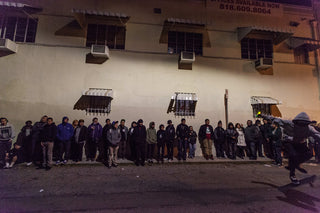What is Streetwear? What does it mean to you? What does it represent?
Back in 2011, our co-founder Bobby Hundreds wrote a list of the “50 Greatest Streetwear Brands of All Time” for Complex. It caused quite a stir to say the least, sparking an immense amount of heated dialogue and beef within the Streetwear community. We think it catalyzed such a passionate response primarily because all of us have such different definitions of what “Streetwear” even is. For instance, the fact that LRG was omitted was downright offensive to some, but Bobby’s definition of Streetwear did not include brands that “[catered] specifically to just an urban or skate audience”—and LRG is an urban brand.
“My definition of streetwear is that what we learned, we learned on the street.” –@BobbyTribal
Bobby recently revisited that controversial list for an in-depth new article he wrote for Complex attempting to define Streetwear through conversations with its insiders and OGs: “‘It’s Not About Clothes’: Bobby Hundreds Explains Why Streetwear Is a Culture, Not Just Product.” He gathered a wide range of responses from 150+ hours of interview footage during the making of his documentary about the origins of Streetwear, Built to Fail.

In the essay, Bobby retraces the subculture’s roots from the West Coast’s X-Large, Fuct, and Freshjive to the East Coast’s Triple Five Soul, PNB, and Subware, to the work of Japan’s Hiroshi Fujiwara, to London’s BOND with its infamous bench and block parties.
“‘Streetwear’ is an art movement, it’s a way of making things.” –@VirgilAbloh
Bobby spoke with the likes of Erik Brunetti (FUCT), Alyasha Owerka-Moore (Phat Farm, Alphanumeric, Fiberops), Bobby Ruiz (Tribal), Tommy Hilfiger, and more, to retrace Streetwear history and what it means to them. From its position at the intersections of art, skate, workwear, street culture, graffiti, and hip-hop, after all these years, Bobby’s personal definition of the subculture remains the same as what he wrote in that 2011 list:
“Every line on this list, with a few exceptions, has built their brand off T-shirts, not catering specifically to just an urban or skate audience, and initializing their distribution through selective channels. Sales distro and image are what ultimately constitute a brand as streetwear, not the art or design.”

Here’s a few of our favorite responses to Bobby’s prompt below. Read the entire article over at Complex and watch the culture magazine’s Blueprint video profile of Bobby if you haven’t HERE.
Streetwear is…
Bobby “Tribal” Ruiz: “My definition of streetwear is that what we learned, we learned on the street. We learned how to iron our clothes by being on the street. We learned how to cuff our pants. We learned how to rip your shirt. We learned how to dress based on our experience on the street, you know what I mean? It wasn’t social media, man.”
Erik Brunetti: “What streetwear has become is what bothers me. Big business corporations have infiltrated streetwear and are currently in the process of rewriting its history to fit their financial narrative. I don’t fit in that narrative simply because I’m aware of what they are doing. By keeping me, Erik Brunetti, out of the picture, it makes it safe for unqualified individuals to enter the industry and become overnight streetwear sensations. Being a friend of a famous rapper seems to qualify. It’s like when a blockbuster movie makes a toy to accompany the release to increase the sales. The movie company does not care about content, only money. Same thing is currently taking place with streetwear. The rapper or reality star needs to be a streetwear designer and own a label to accompany his album. Hype sites and related publications gladly jump on board. Real talent and designs go unnoticed. It’s all become disposable fashion.”
“[Streetwear is] how we feel. It’s how we live. It’s what we listen to. It’s what we eat.” -Edison Chen
Jeff Staple: “I like to call it independently created stuff. It wasn’t streetwear yet. It was just people hustling, doing their own thing without any business or financial gain. Just expression.”
Virgil Abloh: “‘Streetwear’ is an art movement, it’s a way of making things. It’s a rationale birthed by previous art movements and pop-culture life cycles.”
Edison Chen: “It’s a lifestyle. It’s not a clothing piece. It’s how we feel. It’s how we live. It’s what we listen to. It’s what we eat. It’s how we spend our money.”
***

